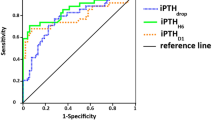Abstract.
Introduction: Calcitonin is a sensitive marker for medullary thyroid carcinoma. Normalisation of calcitonin levels following resection of medullary thyroid carcinoma has been described after a few hours; however, it may be observed more than 4 weeks after surgery. The aim of this study was to correlate the postoperative calcitonin kinetics with preoperative calcitonin levels and tumour stage. Furthermore, we wanted to test the prognostic impact of the calcitonin kinetics. Therefore, only patients with postoperative normalisation of calcitonin levels (biochemical cure) were included in this study. Methods: Fourteen biochemically cured patients were analysed, including measurement of postoperative basal and pentagastrin-stimulated calcitonin concentration. With respect to the time of postoperative basal calcitonin normalisation, patients were classified into two groups: (A) patients with normalisation of basal calcitonin levels within 24 h and (B) patients with normalisation of basal calcitonin levels later than 24 h postoperatively. Results: Eight patients were found to have normalisation of basal calcitonin levels within 24 h (group A). In the remaining six patients (group B), the period to normalisation of basal calcitonin levels varied from 6 days to 14 days and longer. There were no differences between the two groups with regard to tumour size, number and pattern of lymph node metastases and tumour stage. However, preoperative basal calcitonin levels were significantly different (258 ng/ml vs 955 ng/ml, P<0.01). In the group with slow-decreasing calcitonin levels, no strong correlation between the preoperative level and the postoperative time to normalisation of basal calcitonin levels could be established, which may be due to the small number of patients. After a median follow-up of 21 months, no patient developed tumour recurrence. However, an increased basal calcitonin level was observed in one patient from group B. All other patients had normal basal and peak calcitonin levels. Conclusion: Using a highly sensitive calcitonin assay, we demonstrated that normalisation of basal calcitonin levels may be delayed in patients suffering from medullary thyroid carcinoma. The lack of correlation of preoperative levels and the time to normalisation of the basal calcitonin levels, as well as the positive pentagastrin test in some of the patients, argues that this phenomenon is not simply due to prolonged biochemical calcitonin elimination. Nevertheless, a prognostic influence could not be shown in this study due to the short follow up-period. Further investigations and a longer follow-up are necessary to determine the nature and the prognostic impact of delayed normalisation of calcitonin levels.
Similar content being viewed by others
Author information
Authors and Affiliations
Additional information
Electronic Publication
Rights and permissions
About this article
Cite this article
Brauckhoff, M., Gimm, O., Brauckhoff, K. et al. Calcitonin kinetics in the early postoperative period of medullary thyroid carcinoma. Langenbeck's Arch Surg 386, 434–439 (2001). https://doi.org/10.1007/s004230100252
Received:
Accepted:
Published:
Issue Date:
DOI: https://doi.org/10.1007/s004230100252




